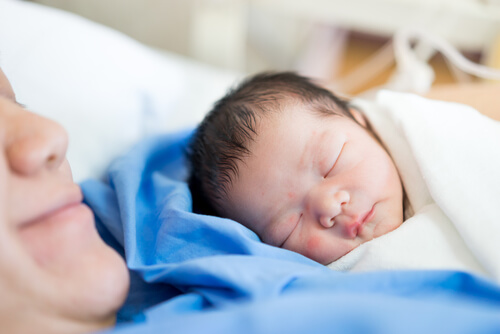Breathing in Newborns

Breathing in newborns is one of the things that most concerns parents. In fact, the first thing you should know is that babies breathe much faster than adults, in addition to having irregular breathing patterns.
Although respiratory irregularities may seem disturbing, there is no reason to be alarmed. The different respiratory frequencies are completely normal and stabilize with the growth of the little one.
Breathing in Newborns
A newborn breathes faster than an adult. This is because they don’t have the lung capacity to hold a lot of oxygen, so they need to inhale and exhale more often.
An adult performs about 18-20 breaths per minute. On the other hand, a newborn inhales and exhales between 40-60 times a minute.
Certainly, breathing in newborns is not consistently rhythmic, as their breaths are rapid and shallow. In some cases, they are longer and slower, followed by shorter ones.
Then, they can pause a couple of seconds and not breathe at all. This is known as “periodic breathing” and is completely normal in most healthy babies.
Also, if you want to make sure that the baby has normal breathing, we recommend you follow the tips below:
- Observe the baby’s chest for a week and look for irregularities in the way the chest rises and falls. If the pattern changes, see a pediatrician.
- Listen to the sounds the baby makes while they sleep. We recommend that you place your ear near their mouth or nose to detect irregularities in their breathing.
- Consider placing your cheek next to your baby’s nose and mouth to feel the moisture and heat while breathing. In this way, you’ll be able to observe if any changes happen while the baby sleeps.

Why Is Breathing Noisy in Newborns?
In many cases, noisy breathing is caused by the sound of air that flows over the saliva and that builds up in the back of the baby’s throat. Unlike adults, babies cannot clear their throat, cough when they want to, or consciously control their own breathing.
Therefore, we recommend using saline nose drops in the situations that you consider appropriate. These liquefy the nasal secretions and help to clean the mucous membranes that may be clogging the baby’s nostrils.
However, before doing this, check with your pediatrician and make sure there is no medical cause that causes noisy breathing.
These are the things that cause the breathing in newborns to be noisy:
- Their airways are small. This means they cannot breathe much air at the same time. They need to inhale and exhale more often than adults.
- The newborn has a very small nose.
- Their nose can be blocked with mucus.
- Babies inhale and exhale through the nose.
- If there is nasal congestion, this makes the breathing more noisy.
- Excess saliva accumulates in the back of the throat.

When Should You Seek Medical Attention?
In babies, minor symptoms can get worse very quickly. Therefore, we recommend that you seek medical attention immediately in the following cases:
- Pauses in breathing that last more than 15 seconds.
- The baby stops breathing and the area around the mouth becomes flaccid, pale or bluish.
- The baby’s skin acquires a bluish color during periods of normal breathing.
- The baby vomits repeatedly or doesn’t eat well.
- High fever -100 ° F/38 º C- or more.
- The baby breathes very fast.
“Babies cry at birth because it is the first time they experience separation from love”
–Kamand Kojouri–
Finally, remember that breathing in newborns may be accompanied by some strange sounds, although in most cases you shouldn’t worry too much.
Only the cases mentioned above deserve special attention and an urgent visit to a specialist.
All cited sources were thoroughly reviewed by our team to ensure their quality, reliability, currency, and validity. The bibliography of this article was considered reliable and of academic or scientific accuracy.
- Association of Ontario Midwives. Comportamiento normal del recién nacido. 2015. [Disponible en línea].
- Aguarón G. Mecanismos de adaptación del feto a la vida extrauterina en el nacimineto. Exploración y reanimación del recién nacido. Seminario, 05-10-2011. Complejo Hospitalario de Albacete. [Disponible en línea].
This text is provided for informational purposes only and does not replace consultation with a professional. If in doubt, consult your specialist.








